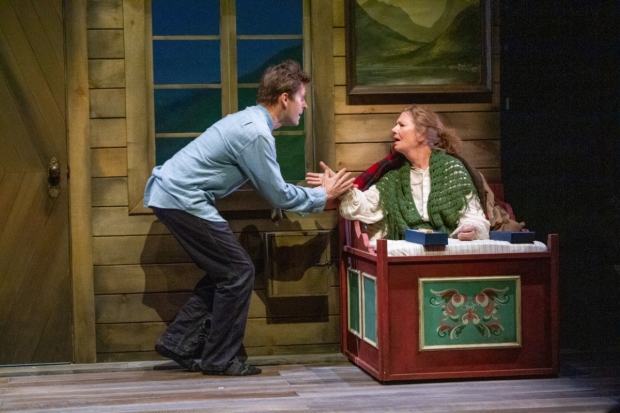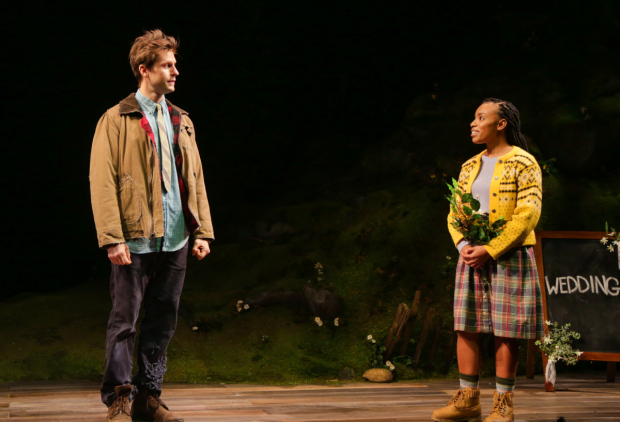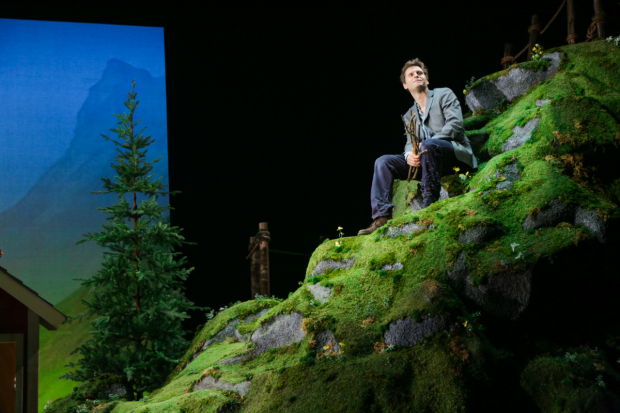Review: Will Eno's Gnit Turns a Typo Into a Parable About the Absurdity of Self-Discovery

(© Henry Grossman)
There's something so jarring about the first time you hear that hard "G" at the front of Gnit. Lest your brain try to organize this collection of letters into "gnat" with an "i," remind yourself you're at a Will Eno play — where most things are ridiculous, and everything, down to the very last vowel, is intentional. Enter our wandering antihero who sets off on a mission to find his authentic self while attached to a name that is an admitted typo.
Gnit premiered at the Actors Theatre of Louisville's Humana Festival in 2013, but only now makes its off-Broadway debut at Theatre for a New Audience's Polonsky Shakespeare Center, directed by Oliver Butler. The play is Eno's wry spin on Peer Gynt, Henrik Ibsen's 19th-century Norwegian play in verse about a man in search of himself. What this "self" really is and how one should go about locating it are questions Ibsen poses in his original work, and that Eno continues to hammer away at in his story about the self-aggrandizing Peter Gnit. However, in service of our modern era where identity politics fuels every battle and radical individualism constantly butts heads with radical love, Eno adds a few more decibels of absurdity to his version to ever-so-slightly reframe the conversation.
Joe Curnutte stars as our titular spelling error, emotionlessly gliding through each scene with static self-delusion. He goes on many of the same fateful adventures as Ibsen's protagonist, and along the way, is met by hordes of off-beat characters played by a troupe of five quick-changing actors. Peter tells his mother (played by the droll Deborah Hedwall) about a wild run-in with a dog that inspires his quest for self-discovery — Eno's riff on Peer Gynt's famous "Buckride" scene. He later steals a bride away from her wedding day and eventually makes a short-lived home with a woman named Solvay (a delightfully self-assured Jasmine Batchelor). The trolls of Ibsen's play are now a family of realtors, and Peter fathers a child with one of them called "Woman in Green" (a shape-shifting Christy Escobar, who also plays the jilting bride). Ibsen's "button-molder," in turn, has become a journalist (Jordan Bellow, who plays a collection of aloof characters), who, instead of melting down Peter's soul, takes a written inventory of his life's achievements. And all the while, David Shih takes on the most unconventional role of "Town," providing the social environment for Peter's adventures as the erratic mouthpiece for throngs of characters who love to bicker.

(© Gerry Goodstein)
If you're familiar with Peer Gynt, most scenes in Eno's riff will ring a bell. And if you're familiar with Eno's past work (The Realistic Joneses, Thom Pain, The Open House), the even cadence and dry humor will also be instantly recognizable. Though it seems his signature word play and stoic antagonism of absurd human behavior would be an ideal match for a parable like Peer Gynt, at times it feels like Eno is just shoe-horning his greatest hits into a story that can certainly carry his sensibilities, but is not always enhanced by them.
"I'm on a journey to discover, to uncover, the authentic self," Peter tells his ailing mother. "Yeah? Get some milk while you're out," she sardonically replies. It's never in doubt that Peter is a fool on a fool's journey. And yet, we patiently wait through two acts of misadventures for him to learn that living selfishly is a waste, without much recognizable humanity woven into Butler's production to keep us invested in these trials. Eno's characters, despite their tendency toward superficial robotic qualities, are absolutely capable of evoking human sympathy. But aside from the few moments Peter sheds tears for the real tragedies that befall him, Cornutte's performance remains largely mechanical in its obtuseness. He, along with the constantly transfiguring ensemble, nail the rhythm of Eno's wit, but have yet to find the humanity inside of it — a shortcoming that may be due in part to the nature of the source material.
Peer Gynt, as an allegory about human nature, is innately plugged into the human experience, but largely floats above it. In service of the latter, Gnit leans into its fairy tale aesthetic, with scenic designer Kimie Nishikawa filling the stage with mossy Norwegian hills on which sit facades of storybook houses (dramatic lighting to match by Amith Chandrashaker), and costume designers Ásta Bennie Hostetter and Avery Reed combining fantastical embellishment with slapdash theatricality. Eno's playwriting language, in its own way, functions on these same competing levels, with characters undemonstratively facing life in its harshest, most literal form. The worlds of fairy tale and Will Eno are both capable of revealing the beating hearts that lie underneath their metaphysical messages. Gnit, unfortunately, just doesn't seem to have a strong enough pulse.

(© Gerry Goodstein)











